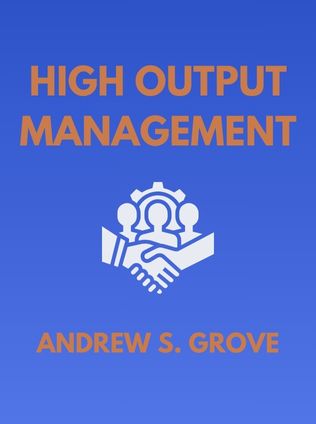
High Output Management
By Andrew S. Grove
Published 01/1983
About the Author
Andrew S. Grove, a pivotal figure in the rise of Silicon Valley, was born in Hungary and later immigrated to the United States. His journey from escaping a war-torn country to becoming the CEO of Intel Corporation is nothing short of inspirational. Grove’s leadership at Intel transformed the company into a global powerhouse, and his methodologies have been studied and revered across industries. He was known for his hands-on approach and an engineering mindset that emphasized efficiency, productivity, and the relentless pursuit of excellence. His contributions to management philosophy, particularly through his book "High Output Management," have left an indelible mark on the business world. Grove's ability to distill complex concepts into actionable insights is what makes his work so influential. He believed that anyone could improve their management skills with the right tools and mindset, and his book serves as a comprehensive guide to achieving just that.
Main Idea
"High Output Management" is fundamentally about the application of manufacturing principles to the world of management. Andrew Grove argues that the principles that govern manufacturing processes—efficiency, throughput, and optimization—are equally applicable to the management of people and organizations. The book teaches managers how to increase their output by focusing on the output of the teams they manage rather than their personal productivity. Grove introduces a formula for managerial output that equates a manager’s success to the success of their teams. This approach shifts the focus from individual accomplishments to the collective achievements of the team, which, according to Grove, is a far more accurate measure of a manager's effectiveness.
Table of Contents
- Introduction
- Managerial Leverage
- Managerial Productivity
- Production and Process Management
- Meetings as a Tool for Management
- Planning and Forecasting
- Control Methods in Organizations
- Conclusion
Introduction
In the introduction to "High Output Management," Grove sets the stage by drawing parallels between the world of manufacturing and the world of management. He argues that just as manufacturing processes can be optimized to increase output, so too can managerial practices. Grove emphasizes the importance of understanding the "output" in management, which he defines as the output of the teams under a manager's supervision. He introduces the concept of "managerial leverage," which is the idea that a manager’s effectiveness is not measured by the amount of work they do, but by the amount of work they enable their team to do.
Managerial Leverage
Grove's concept of managerial leverage is one of the most important ideas in the book. He explains that leverage is the key to maximizing managerial output. Leverage, in this context, refers to the impact a manager's actions have on their team's output. A manager with high leverage is one who makes decisions and takes actions that significantly enhance the productivity of their team. For example, a decision that streamlines a process for the entire team has much greater leverage than one that only affects a single person.
Grove writes,
"The output of a manager is the output of the organizational units under his or her supervision or influence."This statement encapsulates the essence of managerial leverage. A manager's true output is not the work they do themselves, but the work they enable others to do. The more a manager can enhance the productivity of their team, the greater their own output.
To increase leverage, Grove suggests focusing on high-impact activities. These include hiring and training, because they have a long-term impact on the team’s output. Another example is decision-making. A well-made decision can set the direction for an entire team, leading to significant improvements in efficiency and effectiveness. Grove emphasizes that managers should seek out these high-leverage activities and prioritize them over tasks that have less impact.
Sign up for FREE and get access to 1,400+ books summaries.
You May Also Like
The Life-Changing Magic of Tidying Up
The Japanese Art of Decluttering and Organizing
By Marie KondoThe Lean Startup
How Today's Entrepreneurs Use Continuous Innovation to Create Radically Successful Businesses
By Eric RiesWho Moved My Cheese?
An Amazing Way to Deal with Change in Your Work and in Your Life
By Spencer Johnson, M.D.Make Your Bed
Little Things That Can Change Your Life...And Maybe the World
By William H. McRaven



















